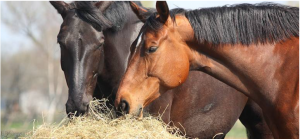 Give Colic the Cold Shoulder This Winter: Colic can strike at any time of the day, month, or year. However, impaction colic occurs more frequently in winter. Decreased water intake usually carries the blame for these impactions. Impactions are a blockage in the large colon. Any feedstuff undergoing digestion causes it. Other management factors also contribute to the problem.
Give Colic the Cold Shoulder This Winter: Colic can strike at any time of the day, month, or year. However, impaction colic occurs more frequently in winter. Decreased water intake usually carries the blame for these impactions. Impactions are a blockage in the large colon. Any feedstuff undergoing digestion causes it. Other management factors also contribute to the problem.
“Horses require approximately 5 to 15 gallons (20-55 liters) of water per day. Signs of inadequate water intake include production of dry, sparse feces and weight loss.” described Catherine Whitehouse, M.S., a nutrition advisor for Kentucky Equine Research.
Forage fermentation requires voluminous water. That is why the large colon and cecum are referred to as fermentation vats. Insufficient water intake forces the body to borrow water from the hindgut, which subsequently hinders the fermentation process and puts horses at risk for impactions.
Enticing horses to drink may be achieved by:
- Offering horses clean water warmer than 40° F (5° C), which may require using heaters;
- Providing a high-forage diet. Water intake links to forage consumption. Higher forage intake stimulates greater water intake;
- Soaking feeds, such as complete pelleted or extruded feeds, hay, or hay cubes in water before feeding;
Delivering the occasional bran mash; - Providing soaked beet pulp, a high-energy feed that provides horses with energy and promotes a healthy hindgut; and
- Sprinkling a little extra supplemental salt, 1-2 oz (30-60 g) for a 1000-lb (450-kg) horse, to stimulate thirst.
Low-quality hay, which is usually high in indigestible fiber (thick stems and few leaves), may increase the risk of impaction in some horses. Further, changes in forage source or type throughout the winter months also increases the risk of digestive disturbances that may progress to colic.
Other factors thought to contribute to winter colic include reduced physical activity if horses are confined to stalls more than normal. In addition, the use of poor-quality hay due to lack of availability, and feeding a limited number of meals per day.
“If only poorer quality hay is available, supplemental vitamins and minerals may be necessary. Offer a vitamin and mineral supplement that serves as a low-intake concentrated ration fortifier,” advised Whitehouse. “Horse owners can also boost forage quality by supplementing with high-quality cubes or pellets. These products offer horse owners a lot of flexibility, especially in the wintertime when forage selection might be limited.”
In conclusion, J & J Hay can help to answer horse-health and hay related questions.
